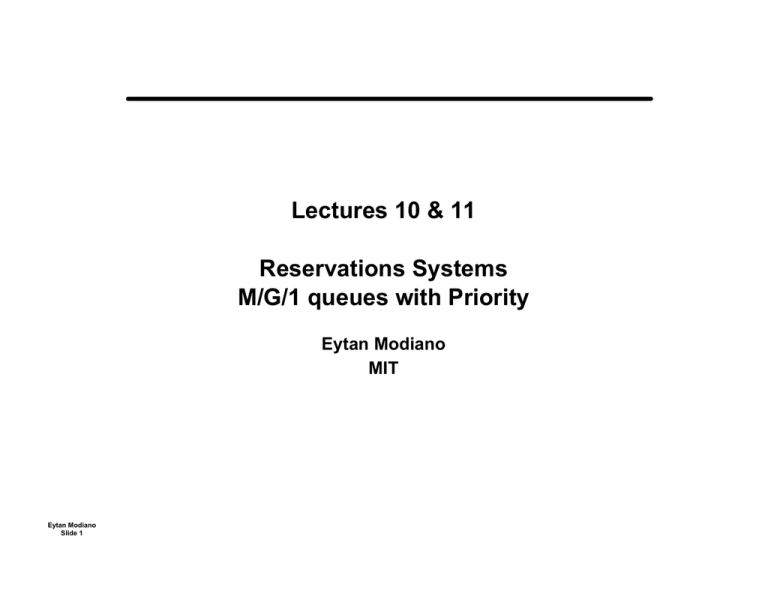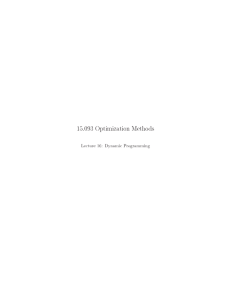Lectures 10 & 11 Reservations Systems M/G/1 queues with Priority Eytan Modiano
advertisement

Lectures 10 & 11
Reservations Systems
M/G/1 queues with Priority
Eytan Modiano
MIT
Eytan Modiano
Slide 1
RESERVATION SYSTEMS
•
•
•
Single channel shared by multiple users
Only one user can use the channel at a time
Need to coordinate transmissions between users
•
Polling systems
–
Polling station polls the users in order
to see if they have something to send
–
A scheduler can be used to receive
and schedule transmission requests
R1
–
–
Eytan Modiano
Slide 2
U1
D1
R2
D2
R3
U2
Polling
station
U3
U4
U5
D3
R1
Reservation interval (R) used for polling or making reservations
Data interval (D) used for the actual data transmission
D1
Reservations and polling systems • Gated system - users can transmit only those packets that arrived prior to
start of reservation interval
–
E.g., explicit reservations
• Partially gated system - Can transmit all packets that arrived before the
•
•
start of the data interval
Exhaustive system - Can transmit all packets that arrive prior to the end of
the data interval
– E.g., token ring networks
Limited service system - only one (K) packets can be transmitted in a data interval
R1
D1
R2
D2
R3
D3
Exhaustive system arrivals
Gated system arrivals
Partially gated system arrival
Eytan Modiano
Slide 3
R1
D1
Single user exhaustive systems
•
Let Vj be the duration of the jth reservation interval
–
•
Assume reservation intervals are iid
Consider the ith data packet:
E[Wi] = Ri + E[Ni]/µ
Ri = residual time for current packet or reservation interval
Ni = Number of packets in queue
•
Identical to M/G/1 with vacations
λE[X 2 ] E[V 2 ]
W=
+
2(1 − ρ ) 2E[V]
Eytan Modiano
Slide 4
λ E[X 2 ] A
When V = A (constant)⇒ W =
+
2(1 − ρ ) 2
Single user gated system (e.g.,reservations)
i arrives
Vi-1
Ri
Wi
Xi-4
Xi-3
Time ->
X i-2
Ni = 4
i-1
W = R +
i
i
X + V
j
i
j=i- N
i
E[Wi] = E[Ri] +E[Ni]E[X] + E[V]
W = R + NQ E[X] + E[V]
W = (R + E[V])/(1-ρ)
Eytan Modiano
Slide 5
(NQ=λW)
Vi
X i-1
Xi
SINGLE USER RESERVATION SYSTEM
•
The residual service time is the same as in the vacation case,
R =λ
•
E[X 2]
2
+
(1- ρ )E[V 2]
2 E[V]
Hence,
E[X 2 ]
E[V 2 ]
E[V]
W = λ
+
+
2(1- ρ )
2 E[V]
1- ρ
•
If all reservation intervals are of constant duration A,
E[X 2 ]
+ A + A
W = λ
2
2(1- ρ )
1- ρ
Eytan Modiano
Slide 6
Multi-user exhaustive system
•
Consider m incoming streams of packets, each of rate λ/m
•
Service times {Xn} are IID and independent of arrivals with mean 1/µ,
second moment E[X2].
•
Server serves all packets from stream 0, then all from stream 1, ...,
then all from m-1, then all from 0, etc.
•
There is a reservation interval of fixed duration Vi = V (for all i)
Arrival from stream 0
Time ->
W
V0
Stream 0
Eytan Modiano
Slide 7
V
1
V2
Stream 1
V
Stream 2
0
V1
Stream 0
m=3
V2
Multi-user exhaustive system
•
•
Consider arbitrary packet i
Let Yi = the duration of whole reservation intervals during which
packet i must wait (E[Yi] = Y)
W = R + ρW + Y
•
Packet i may arrive during the reservation or data interval of any
of the m streams with equal probability (1/m)
–
If it arrives during its own interval Yi = 0, etc…, hence,
Yi = {iV
w. p. 1/ m 0 ≤ i < m
V m −1 V (m − 1)
Y = E[Yi ] = ∑i =0 i =
m
2
Eytan Modiano
Slide 8
R+Y
W=
,
(1 − ρ )
(1 − ρ )V 2 λ E[ X 2 ]
R=
+
2V
2
Multi-user exhaustive system
(1 − ρ )V + λE[ X 2 ] + V (m − 1)
W=
,
2(1 − ρ )
V V( m − 1) λE[ X 2 ] λE[ X 2 ] V(m − ρ )
+
= +
+
=
2 2(1 − ρ ) 2(1 − ρ ) 2(1 − ρ ) 2(1 − ρ )
•
In text, V = A/m and hence,
A
A(m − 1) λE[ X 2 ] λ E[ X 2 ] A(1 − ρ / m)
+
+
=
+
W=
2(1 − ρ )
2m 2m(1 − ρ ) 2(1 − ρ ) 2(1− ρ )
Eytan Modiano
Slide 9
Gated System
•
When a packet arrives during its own reservation interval, it must
wait m full reservation intervals
Yi = {iV
w. p. 1/ m 1 ≤ i ≤ m
V m
V (m + 1)
Y = E[Yi ] = ∑i =1i =
m
2
V V ( m + 1) λ E[ X 2 ]
W= +
+
2 2(1 − ρ ) 2(1 − ρ )
WithV = A/m,
λ E[ X 2 ] A A(1 + 1/ m) λE[ X 2 ] A
1 + (2 − ρ )/ m
+
+
=
+ (
)
(1 − ρ )
2(1 − ρ ) 2 m
2(1 − ρ )
2(1 − ρ ) 2
Eytan Modiano
Slide 10
M/G/1 Priority Queueing
•
Priority classes 1, …, n (class 1 highest and n lowest)
λ k = arrivalrate for class k
µk = service rate for class k
E[Xk2 ] = sec ond moment of servicetime(class k)
•
Non-preemptive system: Customer receiving service is allowed to
complete service without interruption
i=n
2
λ
E[X
∑ i i]
λi
Wk =
, ρi =
2(1 − ρ 1 − ... − ρ k −1 )(1 − ρ1 − ... − ρ k )
µi
i =1
•
Eytan Modiano
Slide 11
Notice that the waiting time of high priority traffic is affected by
lower priority traffic
Preemptive-resume systems
•
When a higher priority customer arrives, lower priority customer is interrupted
–
–
–
•
Service is resumed when no higher priority customers remain
Notice that the delay of high priority customers is no longer affected by that of lower
priority customers
Preemption is not always practical and usually involves some overhead
Consider a class k arrival and let,
–
Wk = waiting time for customers of class k or higher priority classes (1..K-1) already
in the system
Rk = residual time for class k or higher customers
Notice that lower priority customers in service don’t affect Wk because they are preempted
–
–
WI = Waiting time for higher priority customers that arrive while priority k customer
is already in the system
TK = Average system time for priority K customer
Tk = Wk + WI + 1/µ
Eytan Modiano
Slide 12
Preemptive-resume, continued…
k
Rk
Wk =
, Rk =
1 − ρ1 − ... − ρ k
k −1
k −1
i =1
i =1
2
λ
E[X
∑ i i]
i=1
2
WI = ∑ (λ i / µi )Tk = ∑ (ρ i )Tk
k −1
Rk
Tk =
+
+ Tk ∑ ρ i
µ k 1− ρ1 − ... − ρ k
i =1
1
(1 − ρ 1 − ... − ρ k ) + Rk
Tk = ( )
µ k (1 − ρ1 − ... − ρ k −1 )(1 − ρ1 − ... − ρ k )
1
•
Eytan Modiano
Slide 13
Notice independence of lower priority traffic
Stability of Queueing Systems
•
Possible Definitions
– Average Delay is bounded
E(delay) < infinity)
– Delay is finite with probability 1
P(delay < infinity) = 1
– Existence of a stationary occupancy distribution
Occupancy does not drift to infinity
Eytan Modiano
Slide 14
E(delay) < Infinity
•
Example: M/M/1 queue
1
T=
< ∞ ∀λ < µ ⇒ ρ <1
µ −λ
•
Example: M/G/1 queue
λE[X 2 ]
T= +
< ∞ if ( ρ < 1) and (E[X 2 ] < ∞)
µ 2(1 − ρ )
1
Eytan Modiano
Slide 15
P(Delay< Infinity) = 1
•
Slightly weaker definition than E[delay] < infinity
•
P(delay < infinity) = 1 even if E(delay) = infinity
•
Example:
f D (d ) =
2
, d>0
π (1 + d 2 )
E[Delay] =
∫
∞
0
P[Delay < x] =
•
Log[1 + d 2 ]
2d
=
π (1+ d 2 )
π
∞
0
⇒∞
x
2
2 arctan( x)
→ 1
2 =
0 π (1 + d )
x→ ∞
π
∫
In general it can be shown that for any G/G/1 queue
–
Arrival and service time distributions may even be correlated!
If λ < µ, P(delay < Infinity) = 1 even if E(delay) not finite
Eytan Modiano
Slide 16
Existence of a stationary occupancy
distribution
•
Irreducible and Aperiodic Markov chain
–
•
Drift:
Pj > 0 for all states j => all states are visited infinitely often
∞
Di = E[Xn+1 − Xn | X n = i] =
∑ kP
(i,i + k )
k =i
•
When in state I,
Di > 0 => state tends to increase
Di < 0 => state tends to decrease
•
Intuitively, we don’t want the state to drift to infinity, hence for large
enough states the drift better get negative!
•
Lemma: If Di < infinity for all i and for some δ > 0 and i’ > 0,
Di < - δ for all i > i’ , then the Markov chain has a stationary distribution
Irriducible: all states communicate (I.e., positive probability of getting from every state to every other state)
Periodic state : self transitions are possible only after a number of transitions (n)
that is a multiple of some constant d (I.e., n = 3, 6, 9, …). Aperiodic => no state is periodic
Eytan Modiano
Slide 17
Examples
•
M/M/1
Di = E[Xn+1 − Xn | X n = i] = 1(λδ ) − 1( µδ ) = (λ − µ )δ
Di < 0 ⇒ λ < µ
•
λδ
i
i+1
µδ
M/M/m
Di = E[Xn+1 − Xn | X n = i] = 1(λδ ) − 1(mµδ ) ∀i ≥ m
Di < 0 ⇒ λ < mµ ∀i ≥ m
•
M/M/Inf
Di = E[Xn+1 − Xn | X n = i] = 1(λδ ) − 1(iµδ )
Di < 0 ⇒ λ < iµ
Eytan Modiano
Slide 18
For any λ < ∞ and 1/ µ <∞ ∃i' s.t., Di < 0 ∀i > i'
λδ
i
i+1
(ι+1)µδ
